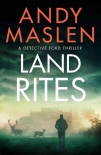Rites of Spring, Anders Motte [reading diary .TXT] 📗

- Author: Anders Motte
Book online «Rites of Spring, Anders Motte [reading diary .TXT] 📗». Author Anders Motte
Thea decides to keep going for another five minutes, then she will give up. A natural track seems to lead in the right direction, until a huge muddy pool, several metres across, forces her to stop. Insects are dancing across the surface of the water, and she can’t help thinking about what Elita wrote in her letter: she saw herself as a nymph, waiting to metamorphose into a dragonfly. Waiting to float away from this damp, stinking place. Just as Thea did from her childhood home.
Suddenly it strikes her. Was that the kind of metamorphosis Elita was talking about? Killing Elita Svart, just as Thea killed Jenny Boman? Creating a new identity, getting away from the people who had already written her off? That could explain why Elita sometimes wrote about herself in the third person, particularly towards the end.
Who killed Elita Svart? Not: Who killed me?
The thought excites her. She needs to re-read the letter to see if her theory holds. If so, what does it mean? That there was no death pact, that Elita never asked Leo to kill her, and therefore Leo really was innocent?
She pulls herself together, works her way around the pool. Battles through a hazel thicket and comes to a group of gnarled old trees that seem to be crouching beneath the leaf canopy high above. These trees don’t look as if they belong in the forest; could this have been an orchard? Her suspicions are confirmed by several square blocks of stone and a pile of planks, which look like the remains of a shed. She pushes at the planks with her foot and sees some plastic containers, grey with age, and a stainless-steel pipe attached to a gauge and a plastic tube.
Thea has seen something like this before, in her father’s garage back home. She’s pretty sure it’s part of a home distillery.
As she sets off again, a noise makes her jump – a sharp crack, like a branch breaking somewhere behind her. She looks around, trying to work out where it came from, but there is nothing. It was probably Emee – she’s been gone for quite a while now.
She calls to the dog, blows the whistle, but there is no sign of her. What could it have been? A deer? A wild boar?
She’s read somewhere that wild boar can be a danger to people. At the same time she realises that the birds have stopped singing. All she can hear is a crow, cawing somewhere in the distance, followed by a faint rustling in the undergrowth.
The hairs on the back of her neck stand on end. She takes out the crowbar, but it’s only half a metre long. It seems a little inadequate as a defence against a charging wild boar. She stands motionless, staring at the spot where she thinks the rustling came from.
Nothing happens. The birds burst into song once more.
Thea lets out a long breath, feeling silly. She pushes on. The ground on the other side of the pool is less boggy, and here and there she can make out hard-packed gravel and shards of tarmac. The remains of a road. She follows them all the way to an uneven row of fence posts. At the end of the row she sees large, dark silhouettes.
Her heartbeat speeds up.
She is in the right place. She has found Svartgården.
57
Svartgården consists of three buildings, as Thea saw in the photographs in the case file. The forest has almost swallowed them up, taken over the yard, crushed the roof of the stable and the barn, leaving only the gables intact.
The house itself looks more or less undamaged, but the vegetation around the walls, which are thick with lichen, has grown so tall that the place appears to be sinking into the ground. Grass and moss on the roof contribute to the look of dilapidation, weeds are growing through the cracks in the stone steps, and rust has eaten away the handrail.
The boarded-up doors and windows make the house resemble a face with neither eyes nor mouth. The boards are held in place with sturdy bolts, as if someone wanted to make sure that it remained both dumb and blind.
Thea calls to Emee, blows the whistle again, but the dog still doesn’t respond. This worries her a little, but she consoles herself with the thought that they’re a long way from the deer enclosure.
She tries the bolts on the front door. Almost thirty-five years of dampness have done their work. The wood is rotten, the nails brown with rust. She inserts the crowbar between the bolt and the board; there is a faint creaking sound.
She glances anxiously over her shoulder; of course there’s no one there, but she can’t help feeling tense. She’s about to do something illegal. Literally open a door that she shouldn’t be opening.
A pheasant crows somewhere deep in the forest, making Thea’s heart beat faster. Is she really going to do this?
What is she hoping to find?
She hasn’t come here to ask more questions, but to find answers. She pushes down on the crowbar; the bolt resists for a second, then gives up with a faint crack as the nails part company with the damp wood.
Thea repeats the manoeuvre twice more to remove the other bolts, then she tears off the boarding bit by bit to reveal the front door. She is prepared to break in, but





Comments (0)